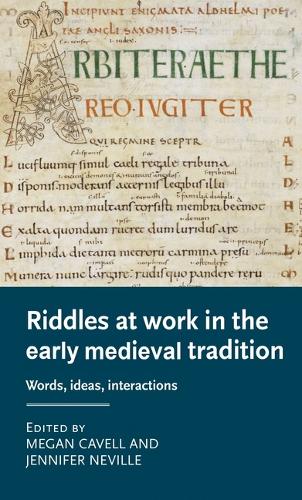
Riddles at Work in the Early Medieval Tradition: Words, Ideas, Interactions
(Paperback)
Available Formats
Publishing Details
Riddles at Work in the Early Medieval Tradition: Words, Ideas, Interactions
By (Author) Megan Cavell
Edited by Jennifer Neville
Manchester University Press
Manchester University Press
7th August 2024
United Kingdom
Classifications
General
Non Fiction
Jokes and riddles
Literature: history and criticism
829.1009
Physical Properties
Paperback
344
Width 140mm, Height 216mm, Spine 19mm
400g
Description
Capitalising on developments in the field over the past decade, Riddles at work provides an up-to-date microcosm of research on the early medieval riddle tradition. The book presents a wide range of traditional and experimental methodologies. The contributors treat the riddles both as individual poems and as parts of a tradition, but, most importantly, they address Latin and Old English riddles side-by-side, bringing together texts that originally developed in conversation with each other but have often been separated by scholarship. Together, the chapters reveal that there is no single, right way to read these texts but rather a multitude of productive paths. This book will appeal to students and scholars of early medieval studies. It contains new as well as established voices, including Jonathan Wilcox, Mercedes Salvador-Bello and Jennifer Neville.
Reviews
'This collection of essays on the subject of the Old English and Anglo-Latin riddling traditions is the first of its kind and represents a major contribution to the field. It promises an up-to-date microcosm of research on these texts and largely delivers on this, with the result that any new student or scholar, particularly of the Exeter Book Riddles, is now equipped with a clear starting point for their research.'
The Review of English Studies
'Riddles at Work can be described variously as a generous sampler, a rich buffet, a panoramic snapshot, or a sizeable cross-section of current Anglophone scholarship on early-medieval riddles originally written in both Anglo-Latin and Old English... Riddles at Work is a product of many authors who have demonstrated their ability to delight, frustrate, amuse, baffle, excite, terrify, impress, and make the readers think and re-think, nod enthusiastically in agreement, and learn something when they have to disagree.'
The Medieval Review
Author Bio
Megan Cavell is Birmingham Fellow and lecturer in medieval literature at the University of Birmingham
Jennifer Neville is Reader in Anglo-Saxon Literature at Royal Holloway, University of London
